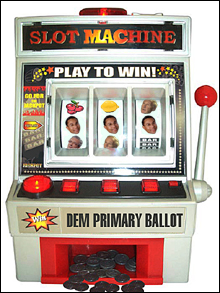
WHO'S FEELING LUCKY?: Will all three Democratic candidates for Massachusetts governor survive their party’s June convention? And should they?
|
It’s the question of the moment in state politics: when the Massachusetts Democratic Party wraps up its 2006 convention on June 3, will all three Democratic candidates for governor still be standing?One thing is clear: Deval Patrick won’t be in any kind of danger at the Democrats’ Worcester confab, where they’ll endorse one candidate and formalize the party’s primary ballot. The former Clinton-administration official scored a huge victory at the party’s caucuses in February, and he looks like a sure thing for the endorsement. But the picture is murkier for Patrick’s two competitors, Attorney General Tom Reilly and venture capitalist–civic do-gooder Chris Gabrieli.
Let’s start with Reilly. As Democratic-caucus results trickled in earlier this year, one rumor had the AG hovering dangerously close to the 15 percent mark. (At this year’s convention, if 15 percent of delegates don’t vote for a candidate on the first ballot, that candidate is done. Finished. Kaput. To get the convention’s endorsement, a candidate needs to hit 50 percent plus one delegate.) The Reilly camp insisted it had reached that threshold, but it never offered any hard numbers. Then there’s Gabrieli, whose position looks even shakier. Since Chris the Good didn’t decide to run until after the caucuses, getting to 15 percent won’t be easy: he’ll need some undecided delegates, a handful of apostates, and a boatload of “add-ons,” a group that includes elected officials and members of underrepresented groups (minorities, the handicapped, and so on).
Last week, after a debate featuring the three Democrats and the independent Christy Mihos, NECN’s Chet Curtis noted that Patrick could be the only candidate to make it out of Worcester. It’s an unlikely scenario but not entirely far-fetched. Suppose Patrick nabbed 75 percent of the delegates at the February caucuses, with 20 percent going for Reilly and 5 percent undecided. (The official results have been closely guarded by the Mass Dems.) If Patrick stays above the 70 percent mark once the add-ons get thrown in, Gabrieli and Reilly could end up fighting for the remaining 29 or 28 percent, with an even split bringing both campaigns to a screeching halt.
Dramatically speaking, it would be a hell of an outcome. Still, none of the seasoned political observers who spoke with the Phoenix seems to think Reilly will be seriously at risk in Worcester. “Reilly has the institutional players, and those folks are not budging,” says one Democratic insider, referring to the AG’s support from elected officials, such as Boston mayor Tom Menino. “And Reilly’s not spending a dime on the convention — he’s saving his money. He just wants to get 15 percent, and he’ll go home.”
Gabrieli should be so lucky. Thanks to a $2 million ad blitz that’s made him a ubiquitous (some would say inescapable) presence on local TV, Gabrieli’s poll numbers have been impressive lately. But while this should help him convince some delegates that he deserves a spot on the primary ballot, it may not be enough to help him reach 15 percent. So, he’s trying guilt! Last week, a letter signed by 19 Democratic legislators (including supporters of all three Democratic candidates) and mailed to delegates by the Gabrieli campaign argued that, if Gabrieli doesn’t advance to the primary, a great wrong will have been done. Here’s the reasoning: